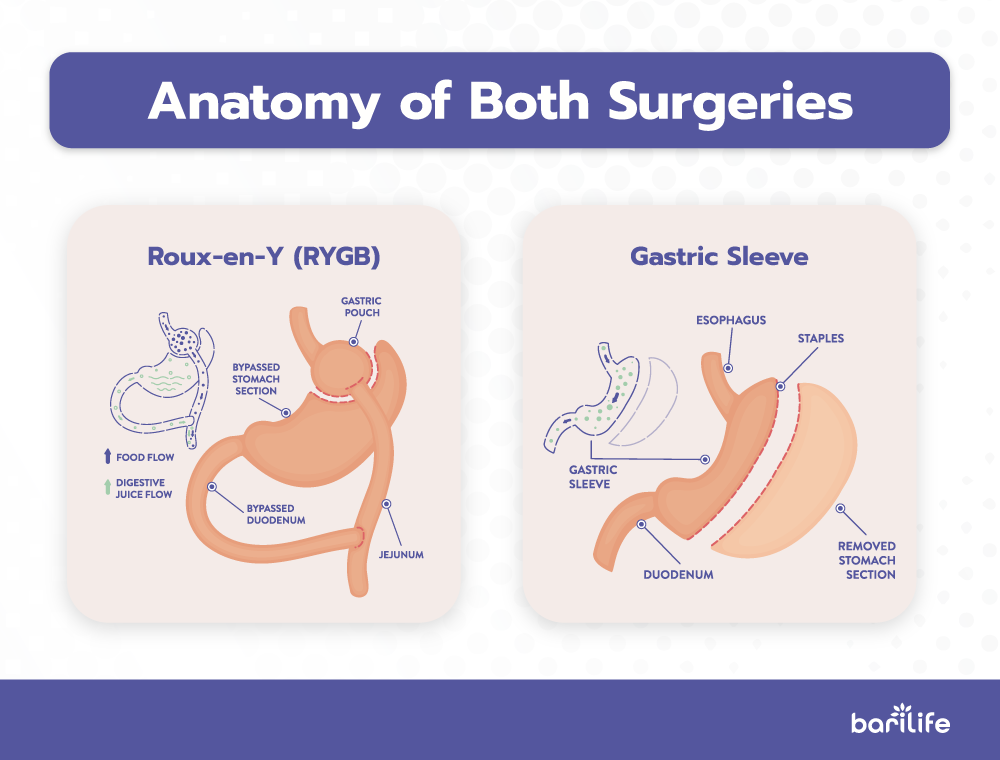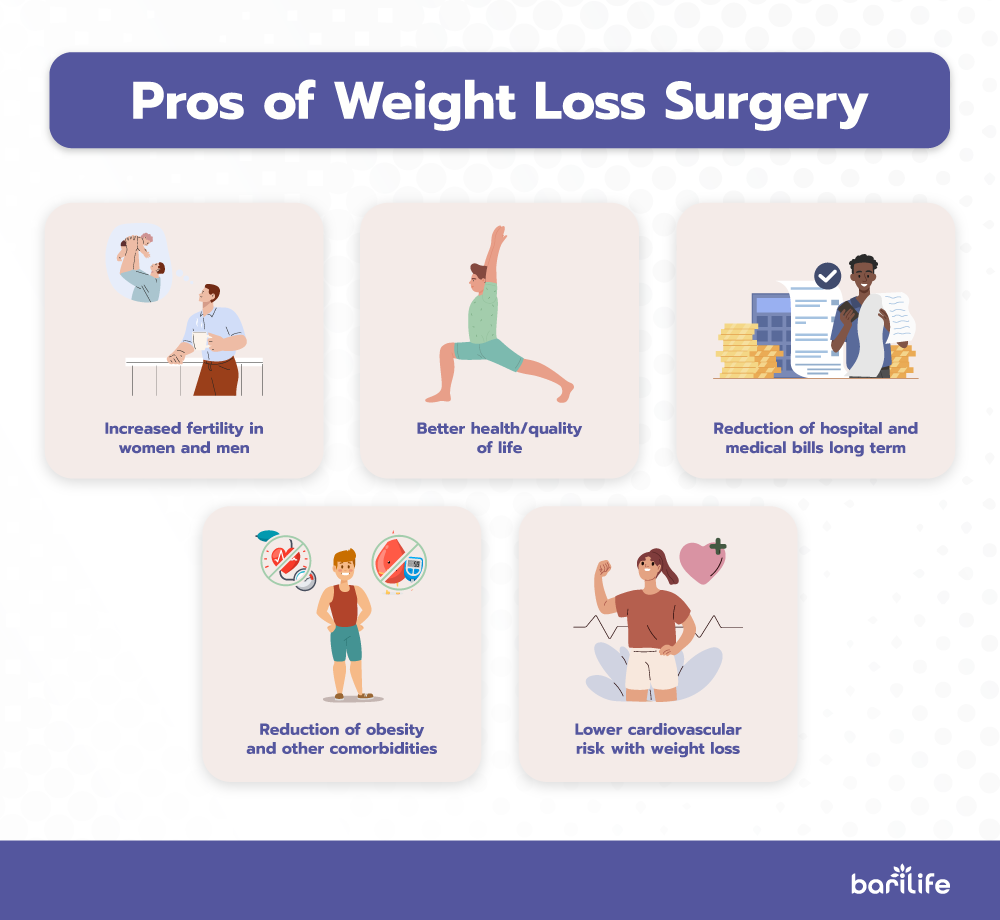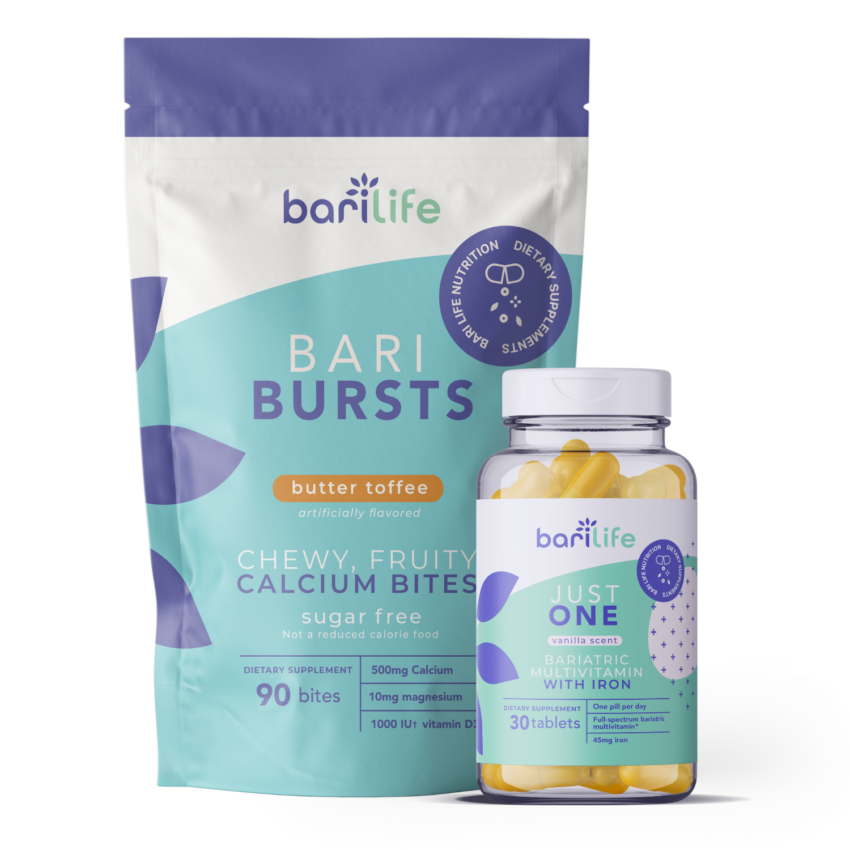Are you considering having bariatric surgery, but are having trouble deciding between gastric bypass surgery vs sleeve ? In this article, we review the two surgeries and the pros and cons of each.
Comparing the Two Surgeries
Before reviewing the pros and cons of gastric bypass versus the sleeve, let’s discuss what each surgery entails.
Gastric bypass surgery is also known as the Roux-en-Y (RYGB). This surgery involves taking a small portion of your stomach and creating a newer, smaller stomach. Next, the new stomach is attached to a different section of your small intestine, thus “bypassing” where some of the food absorptions takes place. Weight loss occurs through two methods, decreasing food absorption and restriction.
Vertical sleeve gastrectomy is also known as the gastric sleeve. During this surgery, the size of your stomach is reduced by removing a portion and a small “sleeve” remains. Weight loss is achieved through food restriction since your stomach size is reduced by about 80%.

Excess Weight Loss
When comparing the gastric bypass versus the sleeve, it’s also important to consider excess weight loss for each. Excess weight loss (EWL) is the potential amount of weight you could lose to achieve your ideal body weight. Below, we review the estimated percent excess weight loss of the sleeve and gastric bypass. Please note that when comparing EWL, it’s also important to consider their timelines.
Gastric Bypass: 65-80% over 18 months
Gastric Sleeve: 50-70% over 2 years
There’s a great, personalized calculator you can use here to compare excess weight loss by procedure type.
Success Rates
Gastric bypass and gastric sleeve surgery have some of the highest success rates when compared to other bariatric weight loss procedures. The gastric bypass success rate is about 75% with 50% excess weight loss within the first 12 months after surgery. On the other hand, gastric sleeve surgery’s success rate is about 80-90%.
Weighing the Pros and Cons
Now that we’ve compared the success rates and expected excess weight loss of the gastric bypass surgery versus the sleeve, let’s review some of the pros and cons of each.
Gastric Bypass (Roux-en-Y)
Pros
- Excess body weight reduction up to 50% within one year
- Quick reversal of comorbidities, such as high blood pressure
- Potential remission of Type II Diabetes
- High success rate
- 65-80%excess weight loss over 18 months
Cons
- Weight regain possible
- Larger, harder surgery than gastric sleeve due to rerouting of digestive tract
- Nutritional deficiencies are common, will have to take supplements
- Higher risk of complications, including dumping syndrome

Gastric Sleeve (Sleeve Gastrectomy)
Pros
- Quick weight loss, up to 70% excess weight loss after first year
- Reduction of hunger due to decrease of ghrelin (hunger hormone)
- Shorter recovery than other bariatric procedures
- Aids with lifestyle changes, resulting in permanent weight loss
Cons
- Risk of nutritional deficiences, similar to gastric bypass
- Irreversible since a portion of the stomach is permanently removed
- Possibility of stomach leakage due to stomach staples
- Chance for slower weight loss

Decide What’s Right for You
Now that we’ve reviewed the pros and cons of gastric bypass surgery versus sleeve, let’s weigh in on some other decision factors. These factors are relevant for any bariatric weight loss surgery.
Pros of Weight Loss Surgery
- Better health/quality of life
- Reduction of obesity and other comorbidities
- Reduction of hospital and medical bills long term
- Lower cardiovascular risk with weight loss
- Increased fertility in women and men

Preventing Complications
There are several ways to prevent complications with bariatric surgery and maximize your weight loss. Let’s review some of the most common (and important!) ways to prevent complications.
- Maintain Your Diet Restrictions: To achieve maximum weight loss and prevent unnecessary complications, always adhere to the guidelines of which phase of the bariatric post-op diet you are in. If your surgeon has recommended you see a nutritionist, then make sure you schedule and keep all of you appointments. They can help you stay on track.
- Exercise: Exercise is another essential component of weight loss. Weight loss should naturally after surgery, but to maintain the weight loss, you will have to exercise. Slowly introduce cardio and strength exercises into your routine to help you build muscle to burn fat.
- Keeping Follow-up Appointments: Make sure to keep every follow-up appointment as scheduled. This not only includes just your surgeon, but every member of your healthcare team, including nutritionists, therapists, primary care, etc. They will help you monitor your weight loss and keep you on the path to success.

Remember, no two people are the same and it’s important to review and discuss your weight loss options with your bariatric surgeon. They will work with you to help you decide what’s recommended and what is best for you and your new lifestyle.





What are your tips and tricks to post-bariatric success?